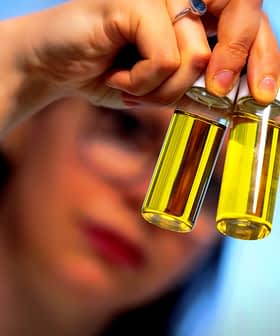Thyme-Enriched EVOO Prevents DNA Damage
Extra virgin olive oil enriched with its own phenolic compounds and the phenolic compounds of thyme prevent DNA damage.
Increasing antioxidant status in people’s diets is an important strategy for decreasing the development and progression of many diseases such as cardiovascular disease, cancer, diabetes, neurodegenerative conditions and others.
Phenolic compounds (PC) in extra virgin olive oil (EVOO) are well known for their antioxidant status, being a bioavailable real food source of these molecules that inhibit the oxidation of other molecules, and it can easily be added to an individual’s standard daily intake. Protection against oxidative stress is beneficial for disease prevention.
A randomized double-blind study, published in the Journal of Agricultural and Food Chemistry, aimed to determine if enriching EVOO with its own phenolic compounds or that of other food sources, such as thyme, could improve the bioavailability of EVOO and enhance its biological properties. The authors of the study suggest, “the protection of body cells and molecules such as DNA, proteins, and lipids from oxidative damage could be considered as a beneficial physiological effect.”
To investigate this, the study looked at the effect of two functional EVOOs, one sample enriched with its own PC, the other sample enriched with both its own PC and thyme PC. Primary outcomes were protection of oxidative stress as measured by urine, plasma oxidation marker and erythrocyte antioxidant enzymes, simultaneously with the detection of urine, plasma, and erythrocyte phenolic metabolites. Thirty-three hypercholesterolemic volunteers (total cholesterol > 200 mg/dL) were randomized to EVOO 25/ mL /day, EVOO enriched with its own PC with 2.88 mg total phenols/ day, or EVOO enriched with both its own PC and thyme PC with 12.10 mg total phenols / day.
The urine oxidation biomarker 8‑OHdG has been widely used as a DNA damage indicator in many nutritional studies as it’s a major base formed after DNA oxidative damage. The reduction in 8‑OHdG was EVOO 0.4 nM, EVOO enriched with PC ‑2.0 nM, and EVOO enriched with both PC and thyme PC ‑4.4 nM.

Thyme
All olive oil samples consisted of the same components other than their PC content. The study found that EVOO enriched with both its own PC and thyme PC “provided major protection against oxidative DNA damage. The antioxidant protection was also reflected in the activity of antioxidant enzymes in erythrocytes… [There was] a parallel increase in thyme phenolic metabolites detected in both urine and erythrocytes. Our data, therefore, provide the first level of evidence for an antioxidant DNA action and antioxidant enzymatic induction through a combination of olive and thyme PC, after a sustained consumption of real-life doses of olive oil in hyperlipidemic subjects.”
To clarify the mechanisms behind these effects, a parallel experiment was performed in animals (20 Wistar rats). The authors state, “It has been seen that hydroxytyrosol acts as an inhibitor of NF-κB activation, leading to the inhibition of proliferation and promotion of apoptosis in human hepatocellular carcinoma cells. Furthermore, inhibiting NF-κB activation reduces ROS production and oxidative damage to lipids and DNA.”
However, they also suggest that thyme PC alone could be sufficient to reduce endogenous DNA damage, therefore further studies in this area are warranted.
Still, the fact that EVOO enriched with its own PC only also showed a beneficial effect over 8‑OHdG provides substantial evidence that enriching EVOO could, in fact, be a suitable way to enhance the level of antioxidants in an individual’s everyday diet and, therefore, reduce the prevalence of disease. If anything, it’s certainly something that is worth further exploration.








